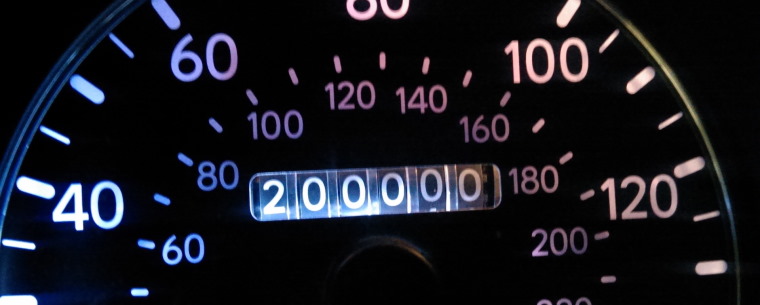Vehicle Milestones: What to Know About Mileage
Jack Dreyer | Friday 15th April 2022 9:30am

Whether youíre buying a used vehicle or a new one straight from the dealership, its mileage will inevitably affect its condition. The more miles you put on the clock, the higher the chance of breakdown, transmission failures, and more.
Your vehicle's mileage can significantly impact its efficiency and value. So, letís explore the most important mileage milestones you need to know and how these can affect your vehicle.
What mileage do vehicles begin to have issues at?
Most vehicles will run smoothly until the 50,000 to 80,000-mile benchmark, but this is not guaranteed. Some vehicles may experience issues with their clutch, oil, and even transmission before this point, depending on how well the vehicle is maintained.
50,000 Miles
Although 50,000 miles is generally considered low mileage, the risks of repairs and breakdowns start to rise.
If your vehicle has cheaper or part worn tyres, they may need changing here, especially if your steering suspension isnít up to scratch. If your vehicle is using its original tyres, they may last up to 80,000 miles. If you have spare tyres to hand, we recommend inspecting them when you reach this mileage. Make sure theyíre roadworthy and in good condition in case you need them.
Some brake pads may also need replacing at the 50,000-mile point, depending on the make and model of your vehicle. If you hear a grinding sound when you press your brake pedal, or you hear squeaking noises or feel a vibration, your brake pads may need changing.
60,000-70,000 Miles
At 60,000 miles, your cambelt, or car timing belt, may need replacing. Your cambelt is responsible for keeping the rotation of your camshaft and crankshaft in sync, and it doesnít last a lifetime. If you hear strange noises from the engine, have trouble starting your car, or are experiencing oil leaks, itís probably time for a replacement.
At this point, you may also experience issues with your engine gaskets. These issues may cause coolant to leak or prevent your engine from starting. Engine overheating and an unexplained loss of coolant are the main symptoms.
To avoid these issues, and to catch them before they develop into serious problems, book in for regular servicing with Kwik Fit.
80,000-100,000 Miles
At the 80 to 100,000-mile point, more significant issues may require your attention.
Common faults at this mileage include broken water pumps, damaged clutches, and more. Your vehicle's fluids will also begin to break down with age, so at this point, you should be changing all fluids, including brake, transmission, power steering, coolant, and oil.
Water pumps are the most common components to break down at this point. These repairs can be costly. We recommend inspecting your water pump and replacing it before any significant damage occurs. If you havenít had your brakes inspected before this point, we recommend checking the disk brakes and rotors and rotating your tyres if necessary.
You can book in for a free brake check with Kwik Fit for this.
Vehicle mileage matters
Remember your vehicle's age, make, and model will affect its longevity. Regular maintenance and inspections are vital, too. Ensure youíre inspecting your vehicle at these milestones to detect issues early and avoid costly repairs.
If you have any questions about your vehicleís maintenance, browse through our blog or contact the experts at your nearest Kwik Fit centre.
Any facts, figures and prices shown in our blog articles are correct at time of publication.
Featured Articles
Is it Illegal to Drive With One Headlight?
Saturday 19th July 2025
Wondering if itís illegal to drive with one headlight? Learn about the safety risks and penalties of illegal blown bulbs and why you should fix them promptly.
Air Con in EVs & Hybrids: Experts Answer Your Questions
Monday 30th June 2025
Does air con drain EV batteries? Can you use the air con while charging an electric car? Find out the answers to these questions & more from Kwik Fitís experts.
Why Is Your Car Making a Noise? Fixes & Tips
Friday 13th June 2025
When your car starts making unexpected noises, it can certainly be quite disconcerting; it may be nothing to worry about, but hereís what you need to know.









